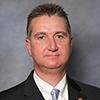Steven Bakhtiar is an expert in radiochemistry, specializing in actinides. He received his Ph.D. in nuclear radiochemistry from University of Arkansas. Bakhtiar's experience ranges from laboratory operations, quality assurance, assessments, training, science education, actinide chemistry, radiological control, and waste management. He is a member of the National Health Physics Society, Waste Education Research Consortium, International Radiological Science Application, Academy of Certified Hazardous Material Management, Institute of Nuclear Materials Management, and the United States Department of Energy Analytical Managers. Bakhtiar is the former director of the DOE’s New Brunswick Laboratory, and is currently senior scientist and laboratory supervisor at URS Corporation at the Waste Isolation Pilot Plant in Carlsbad, New Mexico.
Steven King works for the Penn State Health system at the Milton S. Hershey Medical Center. He is the Director of Health and Imaging physics, is on the Radiology Faculty and has 41 years of experience with Penn State University. A fellow with Health Physics Society, he has actively served the society on many committees and has been a board member and treasurer.
Joseph Klinger recently retired from the Illinois Emergency Management Agency, where he spent over 23 years as assistant director, manager of the radioactive materials program, and head of radioactive material licensing. He also served as the IEMA interim director and as former Illinois Governor Pat Quinn’s homeland security advisor. Klinger currently serves as chairman of the Central Midwest Interstate Low-Level Radioactive Waste Compact Commission, and is a representative of the National Emergency Management Association for the National Alliance for Radiation Readiness. He began his career as a United States Marine Corps combat infantryman in Vietnam, served in the Navy Reserve and Medical Services Corps, and retired in 2009 as a Navy captain. He received his B.S. in Microbiology/Chemistry from University of Texas at Austin and his M.S. in Health Care Management/Public Administration from Southwest Texas State University.
Ruth McBurney is currently the executive director of the Conference of Radiation Control Program Directors, a position she has held since 2007. Prior to that, she was the manager of the Radiation Safety Licensing Branch of the Texas Radiation Control Program. McBurney has served on the Nuclear Regulatory Commission's Advisory Committee on the Medical Use of Isotopes in addition to the United States Food and Drug Administration's National Mammography Quality Assurance Advisory Committee. She is currently a member of the National Council on Radiation Protection and Measurements, and also serves on the NCRP board of directors. McBurney holds a B.S. in biology from Henderson State University in Arkansas and an M.S. degree in radiation sciences from the University of Arkansas for Medical Sciences. She is also certified in comprehensive health physics by the American Board of Health Physics.
William H. Miller is Professor Emeritus in the Nuclear Science and Engineering Institute at the University of Missouri-Columbia, where he has taught graduate nuclear engineering for 39 years. He is the author of over 125 technical papers and has made over 1000 presentations to the public on issues concerning energy, the environment, radiation, nuclear power and workforce development. He is a registered Professional Engineer in the State of Missouri and board certified by the American Board of Health Physics. He received his Ph.D. in Nuclear Engineering from the University of Missouri-Columbia. Miller is currently a Research Scientist at the Missouri University Research Reactor.
Chris Passmore is vice president of Dosimetry Services at Landauer. Passmore has directed Landauer’s technical and operations activities relating to radiation dosimetry since joining the company in 2000. From 2004–2007 he was director of operations and managed Landauer’s manufacturing and analytical laboratory activities. As the vice president of technical services from 2007 to 2013, Passmore led scientific research, dosimetry sciences, applied technology, quality, technical support teams, and analytical laboratory operations. Prior to arriving at Landauer, Passmore worked in the Department of Energy nuclear weapons complex for 10 years, where he led external dosimetry, internal dosimetry, field characterization studies, radiation measurements, radiochemistry, and radiological engineering sections. Passmore is an internationally known expert in radiation monitoring, radiation field characterization, and dosimetry accreditation. He serves as a United States delegate and technical expert to the International Electrotechnical Commission TC45 and International Organization for Standardization TC85.
Cynthia D. Pederson is a retired regional administrator for the United States Nuclear Regulatory Commission. She is the first woman to hold such a high-ranking position, leading a staff of approximately 200 whose mission consists of protecting public health and safety by inspecting 23 civilian nuclear power reactors. Pederson was responsible for licensing and inspecting over 1,000 materials licenses in eight states in the central United States. She was responsible for safety oversight of nuclear power plants, nuclear plant operator examinations, fuel cycle facilities, medical/academic/industrial materials users, incident response, and allegation/enforcement resolution. Pederson is a recipient of the Presidential Meritorious Rank Award in recognition of her service to the U.S. government as a high-performing senior career employee with sustained extraordinary accomplishments. In addition, she uses her experience to encourage young girls to pursue careers in STEM.
Vivian S. Sullivan is program manager for the Laboratory Directed Research and Development Office in the Strategy, Performance, and Risk Department at Argonne National Laboratory, where she manages a $28 million portfolio of research projects. She is also the former senior staff assistant to the chief research officer at Argonne. Prior to her current role, she was manager of the Analytical Chemistry Laboratory in the Nuclear Engineering Division at Argonne. In this role, she was responsible for a service center that managed $1.7 million per year, and for developing and implementing an overarching strategic plan for operations and business management of the Analytical Chemistry Laboratory. She received her B.A. in chemistry from Johns Hopkins University, her Ph.D. in physical chemistry from University of Illinois at Urbana-Champaign, and her M.B.A. from Kelley School of Business at Indiana University.
Dr. Troy Zhou is the Chief Physicist at Johns Hopkins, a position he has held since 2021. With a Ph.D. in Medical Physics from Dartmouth College and postdoctoral training at the University of Pennsylvania, Dr. Zhou has a robust background in diagnostic and nuclear medicine physics. His certification credentials include Diagnostic Medical Physics and Medical Nuclear Radiological Physics, and he holds licensure in multiple states. His career spans both academic and industry roles, including serving as a Senior Staff Physicist at Siemens Medical Solutions and Senior Director at Landauer Medical Physics. Dr. Zhou leads a busy medical imaging physics service across the Johns Hopkins Medicine network, overseeing the safety and quality assurance of over 200 imaging devices. He is also an active member of professional societies like the American Association of Physicists in Medicine (AAPM) and the Radiological Society of North America (RSNA), contributing to technical task groups and subcommittees related to imaging and radiation safety.








